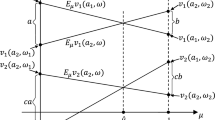Abstract
To justify the use of Wald’s maxmin preferences in an asymmetric information economy, we introduce a mechanism designer who can convince/persuade agents to adopt Wald’s maxmin preferences. We show that more efficient and individually rational allocations become incentive compatible if the mechanism designer persuades agents to use Wald’s maxmin preferences instead of Bayesian preferences. Thus, we justify the Wald’s maxmin preferences by showing that agents can be persuaded to use them in order to enlarge the set of efficient, individually rational and incentive compatible allocations.
Similar content being viewed by others
References
Angelopoulos, A., Koutsougeras, L.C.: Value allocation under ambiguity. Econ. Theor. 59, 147–167 (2015)
Beauchêne, D., Li, J., Li, M.: Ambiguous persuasion. J. Econ. Theory 179, 312–365 (2019)
Carrasco, V., Luz, V.F., Monteiro, P.K., Moreira, H.: Robust mechanisms: the curvature case. Econ. Theor. 68, 203–222 (2019)
De Castro, L.I., Yannelis, N.C.: Uncertainty, efficiency and incentive compatibility: ambiguity solves the conflict between efficiency and incentive compatibility. J. Econ. Theory 177, 678–707 (2018)
De Castro, L.I., Pesce, M., Yannelis, N.C.: Core and equilibria under ambiguity. Econ. Theor. 48, 519–548 (2011)
De Castro, L.I., Liu, Z., Yannelis, N.C.: Implementation under ambiguity. Games Econ. Behav. 101, 20–33 (2017a)
De Castro, L.I., Liu, Z., Yannelis, N.C.: Ambiguous implementation: the partition model. Econ. Theor. 63, 233–261 (2017b)
De Castro, L.I., Pesce, M., Yannelis, N.C.: A new approach to the rational expectations equilibrium: existence, optimality and incentive compatibility. Ann. Finance 16, 1–61 (2020)
Decerf, B., Riedel, F.: Purification and disambiguation of Ellsberg equilibria. Econ. Theory 69, 595–636 (2020)
Degan, A., Li, M.: Persuasion with costly precision. Econ. Theor. (2021). https://doi.org/10.1007/s00199-021-01346-9
Gilboa, I., Schmeidler, D.: Maxmin expected utility with non-unique prior. J. Math. Econ. 18, 141–153 (1989)
Glycopantis, D., Yannelis, N.C.: The maximin equilibrium and the PBE under ambiguity. Econ. Theory Bull. 6, 183–199 (2018)
Glycopantis, D., Muir, A., Yannelis, N.C.: An extensive form interpretation of the private core. Econ. Theor. 18, 293–319 (2001)
Guo, H., Yannelis, N.C.: Incentive compatibility under ambiguity. Econ. Theor. (2020). https://doi.org/10.1007/s00199-020-01304-x
Guo, H., Yannelis, N.C.: Full implementation under ambiguity. Am. Econ. J. Microecon. 13, 148–178 (2021)
He, W., Yannelis, N.C.: Equilibrium theory under ambiguity. J. Math. Econ. 61, 86–95 (2015)
Holmström, B., Myerson, R.B.: Efficient and durable decision rules with incomplete information. Econometrica 51, 1799–1819 (1983)
Hu, J., Weng, X.: Robust persuasion of a privately informed receiver. Econ. Theor. (2020). https://doi.org/10.1007/s00199-020-01299-5
Kamenica, E., Gentzkow, M.: Bayesian persuasion. Am. Econ. Rev. 101, 2590–2615 (2011)
Ke, S., Zhang, Q.: Randomization and ambiguity aversion. Econometrica 88, 1159–1195 (2020)
Kushnir, A., Liu, S.: On the equivalence of Bayesian and dominant strategy implementation for environments with nonlinear utilities. Econ. Theor. 67, 617–644 (2019)
Liu, Z.: Implementation of maximin rational expectations equilibrium. Econ. Theor. 62, 813–837 (2016)
Liu, Z., Yannelis, N.C.: Implementing maxmin incentive compatible allocations. Working paper (2021)
Liu, Z., Song, X., Yannelis, N.C.: Randomization under ambiguity: efficiency and incentive compatibility. J. Math. Econ. 90, 1–11 (2020)
Lombardi, M., Yoshihara, N.: Partially-honest Nash implementation: a full characterization. Econ. Theor. 70, 871–904 (2020)
Moreno-García, E., Torres-Martínez, J.P.: Information within coalitions: risk and ambiguity. Econ. Theor. 69, 125–147 (2020)
Pram, K.: Weak implementation. Econ. Theor. 69, 569–594 (2020)
Qin, C.Z., Yang, X.: On the equivalence of rational expectations equilibrium with perfect Bayesian equilibrium. Econ. Theor. 69, 1127–1146 (2020)
Raiffa, H.: Risk, ambiguity, and the Savage axioms: comment. Q. J. Econ. 75, 690–694 (1961)
Saito, K.: Preferences for flexibility and randomization under uncertainty. Am. Econ. Rev. 105, 1246–1271 (2015)
Zapechelnyuk, A., Kolotilin, A.: Persuasion under insufficient reason. Working paper (2021)
Author information
Authors and Affiliations
Corresponding author
Additional information
Publisher's Note
Springer Nature remains neutral with regard to jurisdictional claims in published maps and institutional affiliations.
We thank Andy Zapechelnyuk, Joel Sobel, Bart Taub, Sayre P. Satterwhite and two referees and the participants at “Seminar Series on Communication and Persuasion” for helpful comments, discussions and suggestions. Zhiwei Liu gratefully acknowledges the financial support from the National Natural Science Foundation of China (Grant No. 71703110).
Rights and permissions
About this article
Cite this article
Liu, Z., Yannelis, N.C. Persuasion in an asymmetric information economy: a justification of Wald’s maxmin preferences. Econ Theory 72, 801–833 (2021). https://doi.org/10.1007/s00199-021-01364-7
Received:
Accepted:
Published:
Issue Date:
DOI: https://doi.org/10.1007/s00199-021-01364-7



